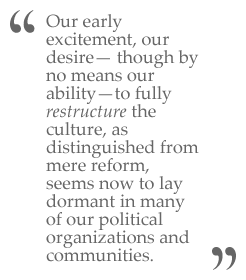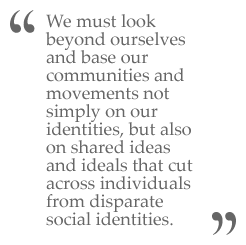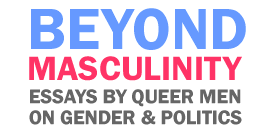|
We laughed together, and we cried together. We shared
our ideas and most intimate secrets. We dreamed our
dreams and laid out plans for a world free from all the
deadly forms of oppression. And, somewhere along our
journey, we began inventing new ways of relating to one
another. For the men, we came to consciousness of how we
had been stifled as males growing up in a culture that
taught us to hate the woman within – that taught us
that, if we were to be considered worthy, we must be
athletic, independent, assertive, domineering, and
competitive. Most of all, we rejected the idea that, to
truly be men, we must bury our emotions deep within the
recesses of our souls.
 Looking back over the years, as our visibility has
increased, as our place within the culture has become
somewhat more assured, much certainly has been gained.
But, also, I can’t help but feel that something very
precious has been lost. Our early excitement, our
desire— though by no means our ability—to fully
restructure the culture, as distinguished from mere
reform, seems now to lay dormant in many of our
political organizations and communities. Today,
reflecting on what seems to be the major focus of the
mainstream movement, I see four main themes — or, what I
am calling the “Four Ms” of the mainstream movement..
These “Ms” are: 1. Marriage Rights, 2. Military
Inclusion, 3. Media Visibility, and 4. Making Money. Looking back over the years, as our visibility has
increased, as our place within the culture has become
somewhat more assured, much certainly has been gained.
But, also, I can’t help but feel that something very
precious has been lost. Our early excitement, our
desire— though by no means our ability—to fully
restructure the culture, as distinguished from mere
reform, seems now to lay dormant in many of our
political organizations and communities. Today,
reflecting on what seems to be the major focus of the
mainstream movement, I see four main themes — or, what I
am calling the “Four Ms” of the mainstream movement..
These “Ms” are: 1. Marriage Rights, 2. Military
Inclusion, 3. Media Visibility, and 4. Making Money.
While these are laudable goals, I believe that if we are
going to achieve a truly equitable society, we must
reach higher, wider, and broader. I believe that we
need to work to
“transform” or “revolutionize” completely the society
and its institutions by challenging overall power
inequities in terms of traditional gender and racial
constructions, the economic basis on which this country
rests and the massive inequities between socioeconomic
groups. We need to make links in the various forms of
identity and forms of oppression, and form coalitions
between various marginalized groups, as well as look at
other means of activism, which can result in true and
lasting systemic change.
I do remain hopeful, however. The increasing visibility
and recognition of bisexuals and transgender people
today is again shaking up traditionally dichotomous
notions of male/female and gay/straight. Their stories
and experiences have great potential to bring us back
into the future — a future in which the Estelles
(indeed, anyone on the gender spectrum) everywhere will
live freely, unencumbered by social taboos and cultural
norms of gender. It is a future in which the “feminine”
and “masculine”— as well as all the qualities on the
continuum in between — can live and prosper in us all.
With this in mind, let us not work only toward lifting
the ban against gay, lesbian, and bisexual people in the
military. Instead, let us also work toward lifting the
ban against our transcending and obliterating the gender
status quo by continually questioning and challenging
standard conceptualization of gender in our society. For
ourselves and our young, we must work to build a society
in which we can all feel the freedom to express our
gender in ways that are authentic, honest, and sincere
to each individual, ways that we choose rather than
those that are prescribed.
Let’s face it: transphobia is our issue, too. As
important as are our efforts in defeating sexism,
homophobia, heterosexism, and biphobia, also important
is our work toward conquering personal, institutional,
and societal forms of transphobia and its offshoots,
such as what some call “effemiphobia” (or, as it has
also been called, “sissyphobia”) — that insidious and
dehumanizing fear and hatred of anything even hinting at
the feminine in males. This is, of course basically a
thinly veiled version of misogyny. Indeed, we can argue
that homophobia, biphobia, transphobia, and
heterosexism, have their roots in sexism. One cannot
hope to eliminate the former categories without
eliminating the latter.
While we continue to work on issues around same-sex
marriage and domestic partnership, we should ensure that
we work, as Estelle has done
for me, towards strengthening a partnership between the
many points on the vast continuum between our masculine
and feminine qualities that make us all whole,
integrated human beings. We must not, however,
limit our efforts to these forms of oppression. For
oppression operates like a wheel with many spokes. If we
work to dismantle only one or a few specific spokes, the
wheel will continue spinning and trampling over people.
We must work toward dismantling all its many hideous
spokes if we hope to ever truly dismantle oppression.
 I believe that sexual and relational attractions and
gender expressions alone are not sufficient to connect a
community, and by extension, to fuel a movement for
progressive social change. We must, therefore, look
beyond ourselves and base our communities and movements
not simply on our identities, but also on shared ideas
and ideals that cut across individuals from disparate
social identities. We must come together with like
minds, political philosophies, and strategies for
achieving their objectives. I believe that sexual and relational attractions and
gender expressions alone are not sufficient to connect a
community, and by extension, to fuel a movement for
progressive social change. We must, therefore, look
beyond ourselves and base our communities and movements
not simply on our identities, but also on shared ideas
and ideals that cut across individuals from disparate
social identities. We must come together with like
minds, political philosophies, and strategies for
achieving their objectives.
This is my vision of a movement
for social change, which
follows a
central tenet of Jewish tradition known as
Tikkun Olam: meaning the transformation, healing,
and repairing of the world so that it becomes a more
just, peaceful, nurturing, and perfect place. I
understand Tikkun Olam to be equivalent of
working for social justice and social equality,
sometimes against incredible odds, for people of all
social identities and all backgrounds.
Whenever individuals or groups oppose dominant
ideologies and dominant group privileges, however,
there is always a risk of
ferocious backlash. The vicious attacks against Estelle
are only one case in point.
Currently, there is a cultural war being waged by the
political and theocratic right, a war to turn back all
the gains progressive-minded people have fought so
tirelessly for over the years. Until LGBT organizations
and movements join in coalition with other communities
working to end oppression, we will never achieve a
genuine sense of community, and a genuine sense of
equality will be wholly unattainable... (continue reading)
|




2 COMMENTS ON THIS ESSAY:
I just loved Estelle and your vision...
Thank you for sharing it with all of us! :)
п»ї
Great page. Good stuff.